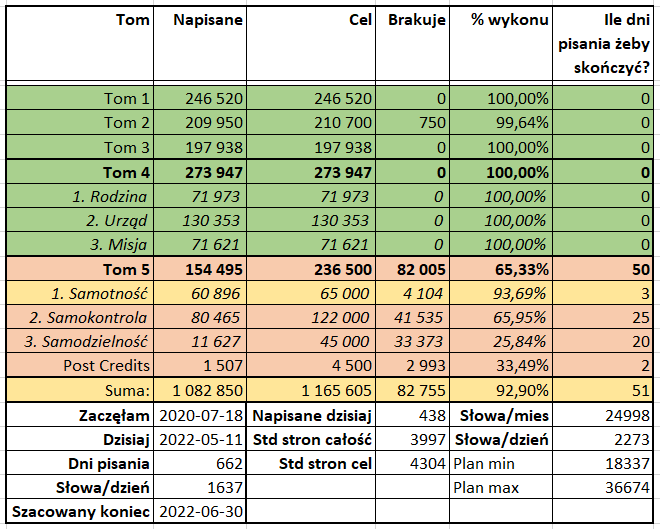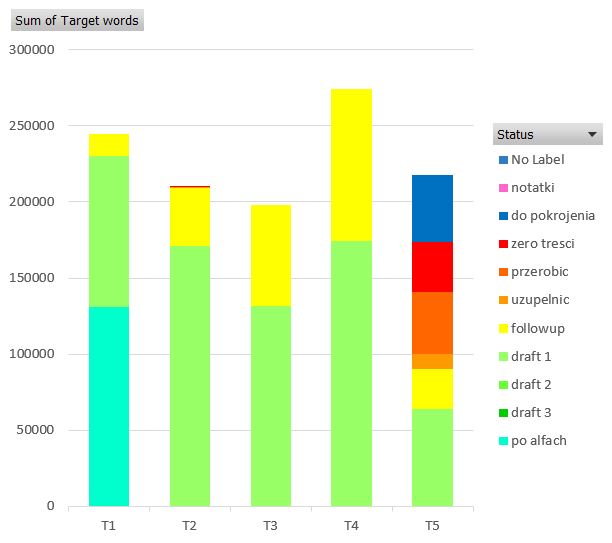“This jury now calls Glenda McTavish, also known under her professional pseudonym of ‘The Fairy Godmother’. Ms McTavish stands before us accused of multiple cases of impersonation, manipulation of public plebiscite, kidnapping, mobbing, theft and, finally, witchery. We will be hearing witnesses to these deeds over the duration of this day and the following ones until such time as either the accused one admits she had been in the wrong and recompenses her victims accordingly or it is proved beyond all doubt that the accused had nothing whatsoever to do with the crimes listed.”
The guardian of the court chamber smashed the bottom of his staff three times against the stone tiles of the floor.
“Glenda McTavish!” he announced, as a plump, jolly-looking woman in an orange jumpsuit was walked to stand in front of the judge, guarded by two well-built young men in uniform.
“Please state your name for the protocol.”
“Glenda Alberta Augusta McTavish.”
“Please confirm, in your own words, what is your understanding of the topic of today’s proceedings.”
“I am accused of multiple crimes that had been perpetrated on various people of this kingdom.”
“And how do you plead?”
“Not guilty, your honour.”
“You do understand the seriousness of the charges laid against you?”
“Well, your honour,” she smiled serenely from under her lacy, frilly cap. “If I tell you I understand, and I do not know what I should know, what will it change? I will still be honest and you will still get the wrong answer.”
The man behind the large table squinted.
“Very well. One case of being an accessory to impersonation. One case of interference with royal succession. One case of distributing potentially poisonous plants to minor children. Nine confirmed cases of impersonating a prophet or claiming to have prophetic abilities. Seventeen cases of interfering with already promised engagements. Two confirmed cases of affecting a child’s appearance for no obvious reason. Two confirmed cases of gifting children with actual, openly-stated misfortune. There is at least a score of lesser charges laid at your door, each amounting to at least a year in gaol. However of the major charges, they can cost you a lot, Ms McTavish.”
“I see, your honour. Am I allowed to say anything to my defence? I would not like to be judged in contempt of the court.”
“You may, Ms McTavish, but be brief about it.”
He sat back, looking down at the wrinkled face that twisted up in concentration.
“I admit to having perpetrated these actions,” she said, and the room behind her started booing her. “I admit. But I do not agree that any of them had been an actual crime. All that you have listed has been done in order to deliver alms to the ones who needed them and correcting wrongs that had been done to the suffering ones.”
She looked up and the judge found himself smoothing out the frown that usually marred his forehead.
“Very well. Let’s go through the list and you can explain everything to us step by step. If that will be fine with you?
The woman nodded slowly.
“For the record, please state your acceptance aloud.”
“Yes, that will be fine with me,” she sighed.
“You may sit, Ms McTavish. It is not the task of this court to torture the people giving statements, even if they are the suspects. Very well. Comfortable?”
“Yes, your honour,” she said simply, sighing again.
For a person her age she certainly looked well.
“First case we have on the list is the fact that you had aided in an impersonation of a noble-born woman, aiding a… scullery maid to gain social advancement through the means of unscrupulous deception, forgery and plain trickery, perpetrated upon the highest born of that land. Now, what say you?”
“I say, if what you are alluding to is the case of Ella, the cleaning girl, named by her family for the task she did the best, ‘Cinderella’, that this was a case of a specific contract that I had been sent to fulfil and I can only claim that I did the best that I could for my client. He wanted a wife that would have no links to the local nobility or even gentry, no hangers-on in the family to feed off her and have mind open to the opportunities granted by her elevated station.”
There was a sound of unrest in the chamber, so he signalled for order and turned back to the kindly-smiling woman in the witness chair.
“Are you claiming that this had been a business arrangement?”
She sighed yet again, as if impatient.
“Of course it was! There is a contract that the side who seeks my services signs and it delineates in detail what they wish to achieve and what conditions they put as to the completion of the deal. How else could I work? I’m not in the business of straightening everyone’s messes.”
“But that would mean that the prince… I mean, His Royal Highness…”
“Knew perfectly well who he was marrying. The whole glass slipper trick was part of the agreed communication. He knew perfectly well which house to go to and where to demand to be shown all young ladies living there. After all, how many girls are there in the capital itself with this shoe size? It would be absurd as an actual means of identification.”
“Are you claiming then that… the heir of the kingdom…”
“Had availed himself of my services as a matchmaker. Indeed. I even have the letter of thanks he had sent me on their first anniversary.”
He frowned and looked at the long list of similar accusations that had been collected by the officers of the court and a variety of more and less shady personages from the local constabulary.
It was going to be a long day.
#
It was. As the interrogation of the suspect – or rather, an interview with the shrewd local businesswoman – progressed, people kept changing in the chambers. To nobody’s surprise at all, most of the people slotted to be witnesses against her quietly slunk away before their turn could even come, and journalists of varied kind appeared, taking down her words, keenly attentive to the details pertaining to the high and mighty of local society, eyes open for the tiniest suggestion of a scandal.
There was a slight frisson of excitement when the discussion turned to the two specific royal children that the woman had, as she had claimed, gifted with misfortune, but her answers were so dispassionate and calmly stated that nobody could fault her in her reasoning.
“I went with the newest trends in child-rearing,” she smiled tiredly. “Children should not be isolated from the realities of the wold surrounding them and should know from their first steps that the world is out there, waiting to hurt them. I didn’t actually give them anything specific, but simply told so in front of their families. This way they would blame at least the minor accidents on me and yet would not pack the children away in cotton wool and wrap them in soft covers – they’d know that some pain and some unhappiness is a crucial part of the growing process.”
“You read the new publications on child minding then?” he asked idly. “I would assume, at your age…”
“Young man, at my age and with my profession, I am practically required to be up to date with the theories put forward by the modern scientists. Your honour.”
He dearly wished he could ask her for her favourite lemon biscuit recipe. He was quite sure she was one of these grandmas who baked for their favourite grandchildren.
But he remained professional, as one does in such cases, and continued with the list.
“Item the thirty-eighth, the…” he frowned at the paper and looked up to check with the court secretary. “The singular case of teaching young children how to operate heavy… Excuse me, who had put it on the list?”
“Ah, I did, sir,” a young officer from the local municipal force rose from his place. “I had been on the team that responded to the initial call for support in the case that resulted from this… inopportune knowledge sharing on the side of the accused.”
“And what did the accused have to do with the case you mention?”
The young man stood there, cringing in his spot like a victim of an overly long queue to the privy.
“It was a case of the late widow of the baker Thomas, the one who used to live in the woods a few leagues from our town. It seemed that she had been keeping some servant children who had been given instruction by the accused as to how the heavy oven door is operated and thus, in the process of practising these skills, had pushed the late widow Thomas inside and closed the door upon her. As the job training should be, by law, provided solely by the members of relevant guild, society or worker’s union, the accused Ms McTavish had broken the regulations pertaining to these and so should be prosecuted for that infarction, being as she is unlicensed in the profession of baking.”
The constable certainly looked triumphant at his pronouncement. It was obvious to the judge that the young man’s grandmothers had been stingy with sweets when he was a child.
“Very well. This is a complicated matter and so would need to be heard in front of the guildmasters of the town, too, but I’d like to first give Ms McTavish the chance to explain herself, for the record.”
She was already shaking her head.
“These poor, poor children,” she heaved another sigh. “She left them with no instruction at all. She might have been the widow of the Guildmaster and so accepted as a member of the Bakers’ Guild, and I am all for the emancipation of women and acceptance in the craft community, but there are some who abuse that rule and so did widow Thomas. To put it frankly, she knew only how to bake one thing – and that was her world-famous, construction-grade gingerbread. She always overheated the oven and so anything else came out of it less than edible… or, to be frank, more on the ‘scorched’ side of the ‘well-done’ scale. And she never taught the children any kind of work safety rules! She even caged one of them – for his own good, she claimed – but what kind of a solution is that? I thought we were moving towards more modern ways of managing unruly children than chaining them to the wall or locking them in a broom closet.”
“Well,” he frowned and tongued the spot where one of his incisors used to be – the one he had lost in an uneven battle with a piece of widow Thomas’ world-famous gingerbread. “I think we can put this one under ‘household instruction of minors’ which is an acceptable action for any adult to take when faced with a child exposed to dangerous conditions, I hope we can agree to that,” he looked from over his glasses at the court secretaries and the young constable. “Is there anything else?”
Nobody made a sound.
“Very well then, Ms McTavish is free to go – I only ask you not to leave the town boundaries, in case there are any points raised by the officers of the court based on the testimony you have provided.”
She rose slowly, stiffly and a bit shakily even.
“Thank you, your honour,” she smiled at him kindly. “I will have my lemon tart recipe sent to your wife tomorrow morning.”














